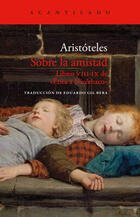The entire eighth and ninth books of Nicomachean Ethics, one of Aristotle's most famous and influential treatises, are dedicated to friendship. The philosopher not only considers it necessary but also beautiful: no one would desire a life without friends, no matter how rich it might be in other benefits. Friendship is, therefore, an indispensable virtue at every stage of life and for every human community. But aren't there different types of friendship? And are they all equally virtuous? Some relationships are based on pleasure, others on convenience, and others simply on the desire of both parties to do good and to offer mutual gifts. Which are more lasting and have more beneficial effects, even in political life? A lively reflection that challenges the reader to reflect on a dimension of individual and collective existence without which we would not know civilization.
Shopping cart
Loading cart
Important notices
|
|
Recordando a André Rouillé: Su legado en la fotografía André Rouillé 1948 - 2025 |
|
|
Libros de filosofía y co. Disponibles en Librería Herder |
|
|
Revista Filosofía & Co. nº 9 Nueva revista de filosofia divulgativa y actualidad |
|
|
"Espacios de la filosofía" - Mauricio Beuchot - Novedad Herder México |
|
|
Revista Filosofía & Co. nº 8 Nueva revista de filosofia divulgativa y actualidad |
Pay safely with:


In the webshop
New
|
|
Medios calientes 70159 $400.00 -0.00% $400.00 |
|
|
El bestiario de Michel Foucault 70404 $749.00 -15.00% $636.65 |
|
|
Regresar afuera 70148 $275.00 -0.00% $275.00 |
|
|
La instauración filosófica 70142 $570.00 -20.00% $456.00 |
|
|
La fuerza de los fuertes 70405 $519.00 -15.00% $441.15 |
In the press
Promotions
|
|
El Gobierno de las emociones 65449 $965.00 -60.00% $386.00 |
|
|
Prosa y poesía. Homenaje a Gonzalo Sobeja 70242 $1,755.00 -25.00% $1,316.25 |
|
|
Lingüística española aplicada a la terapia del lenguaje 70239 $300.00 -25.00% $225.00 |
|
|
Introducción a la filosofía 70243 $620.00 -25.00% $465.00 |
|
|
El tratamiento de los niños autistas 70240 $675.00 -25.00% $506.25 |






